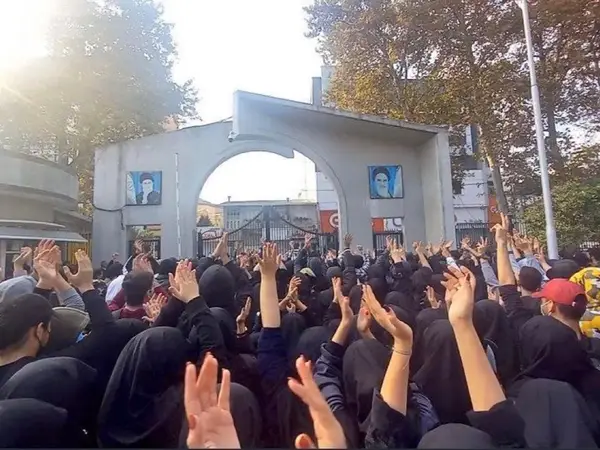As the anniversary of the Mahsa Movement in September approaches, Iran’s regime is worried about the possibility of unrest in universities spilling over to the streets.
“The enemy has not given up. They’ve said that universities are the first place where new riots should begin,” the official in charge of Supreme Leader Ali Khamenei’s representatives in universities across the country, Mostafa Rostami, said at a gathering.
In advocating for preventive measures, Rostami said, “They will completely be defeated if they can’t do something on the anniversary of last year’s riots.”
Iranian authorities always refer to anti-government protests, even peaceful demonstrations, as riots.
At the same gathering, Brigadier General Yadollah Javani, chief of the political bureau of the Revolutionary Guards (IRGC), said “vindication jihad” should be carried out in universities before the upcoming parliamentary elections in March.
In recent years, Khamenei has applied the phrase ‘vindication jihad’ (jihad tabyyin) to efforts both in the media and on social media platforms and has referred to supporters and employees active in social media as "soldiers of soft war." The term basically means propaganda efforts.
“The enemy has invested its hope in the coming months until the end of the [Iranian calendar] year [March 21]. All their evil plans will fail if we can be present in universities carrying out vindication jihad and people create an epic in March [with their presence in the elections],” Javani said.
Iranian students had a very active role in the protest movement that was sparked by the death of 22-year-old Mahsa (Jina) Amini in the custody of morality police. Since then, hundreds of students have been expelled or suspended for their activities.
At the same time, activists both inside Iran and abroad have been discussing on social media the importance of the anniversary to show the regime that the protest movement is alive and strong.
Student sources say the Supreme National Security Council (SNSC) has recently bestowed extraordinary powers to university authorities and security forces to control students and their professors, including the power to suspend those who are known to be government critics. This week, two theology professors at Isfahan University were suspended for “opposing the government and Islam”.
In June tensions grew in universities when security forces cracked down on students at Tehran University of Art protesting draconian hijab laws.
In recent months, the anti-compulsory hijab movement has gained greater momentum, particularly in universities, with many students defying the rules as a form of civil disobedience, showing up on campuses without a headscarf and wearing ordinary cloths instead of the mandatory long coverings.
“It’s ten months since the Mahsa Uprising, during which we demanded our right to life. Today, [ensuring one’s] right to life depends on recovering [lost] civil rights. We have no exit path other than resistance … because passivity in the face of exclusion would only mean perishing,” students of Tehran University said in a statement last week.
“Under various pretexts, from [non-abidance to rules of] hijab to student activity, students are maliciously deprived of their right to study even if they manage to get in,” the statement said.
Students also criticized “dual standards” that allow members of Iraq’s Hashd al-Shaabi to study in Iranian universities by the virtue of belonging to proxy militia forces but blocks “ideological outcasts” and lower-class Iranians even if they are gifted.
Critics say Iran's university admissions system heavily favors students from the wealthiest families who can afford expensive tutors and classes to prepare for admissions to top universities in highly sought-after fields.
